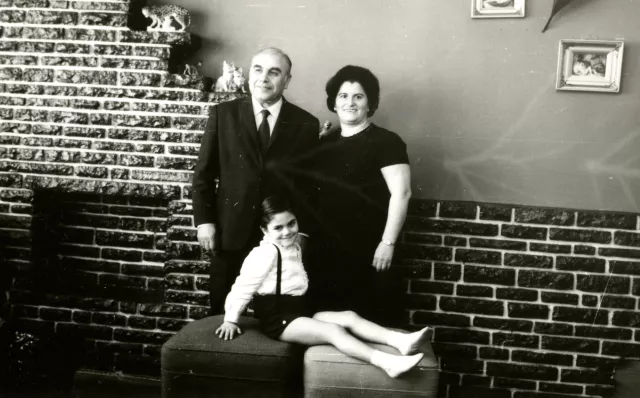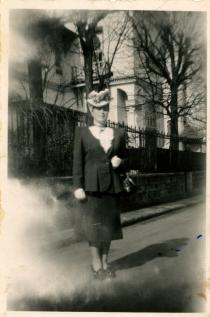My older sister Fortune, her husband Sabetay, their son Nisim
In this picture are my older sister, my brother-in-law and their younger son Nisim.
My older sister Fortune who was born in 1917 in Kuzguncuk, finished elementary school and because my father was a visionary, became apprentices to a tailor along with my sister Sara, and became tailors. In this way both my older sisters were able to financially help their spouses for a long time. With time, the small sewing jobs that my older sister started in Ortakoy developed into a large clientele, so that one of the rooms of the house became a workshop. In this workshop, along with a few young ladies, the biggest helper of my sister was her sister Sara. Every Monday, new orders would come in, Friday before noon, the last ironing would be applied to the orders and hung on a rope that was stretched from one wall to the other in the room and delivered to the customers. The room would be cleaned up for the Sabbath, at the end of Sabbath, it would be converted back to a workshop.
My brother Davit took my older sister Fortune everywhere he went, in this way she fell in love with a member of the group, Sabetay Farsi. Sabetay, even though he felt close to my sister, considered her only a friend because she was the sibling of a group member. In the meantime, a family from Ortakoy asked permission from my mother to match a young man to my sister, however my sister did not even want to meet this young man, she was seriously in love with Sabetay. This situation continued for a while as a one-sided crush, finally my sister's mood, her lack of appetite, her lack of interest in everything, started to upset my mother and father. They said to my sister: "My dear daughter, what is it? We notice you are more down and sad every day? Let us take you to the doctor, so he can examine you well, what do you think?".
My brother Davit understood the problem since he knew my sister so well and went to Sabetay and said, "Look, my dear Sabetay, my sister Fortune likes you a lot, yet you pretend like she doesn't exist. Do you find her so repulsive that you do not approach her?" Sabetay: "How is that possible? I like her too but because she is your sister, I could not approach her and open up the way I wanted to. Of course I would like to get to know Fortune better". When everything was out in the open, my sister dated Sabetay who was a typesetter in a small printing house for a while. (Unfortunately I do not know his education level) My family accepted Sabetay immediately, because he was a very good, honest, humble and pleasant person. When I say dating, don't think about the dating that goes on today, there was no such thing. Only once a week, in general on Sundays, there was a gathering place called "Hemla" in Balat (a Jewish neighborhood on the European side) that the community owned. My older brother would play there every Sunday with his friends, dance, chat and eat and drink the cakes and lemonade that were offered. The young couple got to know each other this way.
My sister Fortune was engaged to Sabetay, who was in a typesetting job in a printhouse before my brother-in-law went to the military; on his return, they opened up their own printshop with his older brother on Kumbaraci Yokushu (Piggybank Maker Hill) [A neighborhood on the Europeanside]. They would print invitations, cards, signs and bulletin boards in this printhouse.
My older sister Fortune married Sabetay in the Zulfaris Synagogue (on the European side, where today the Jewish museum that is known as the 500th Year Foundation is situated) probably around 1942, even if I cannot remember the exact year. My sister worked as a tailor for long years in Galata [A neighborhood on the European side where Jews lived together], since my brother-in-law did not earn too much money from this printhouse, that is how they managed to raise their children. As you can see, my sister's family barely made ends meet but despite everything the spouses adored each other, they protected each other throughout their lives and always treated each other with respect. My brother-in-law Sabetay was a very easy person to get along with, he was optimistic and pleasant and yet he always took his family under his wings. My brother-in-law Sabetay unfortunately developed cancer and died in 1977, and my sister Fortüne in 1991 due to a heart attack. We interned both in Ulus.
My sister Fortune had Beki in 1944, Meri in 1947, and because they always wanted to have a boy, their son Niso was born after a long period in between, in 1965. My sister had her daughters at home with the help of a midwife, and her son in the hospital.
Their older daughter Beki attended elementary school in "Alliance Israelite" and then went to Saint Benoit; after graduating from junior high married Sami Hakim who was 15-17 years older than her in 1962 in the Zulfaris Synagogue. Beki had sons named Ariel in 1964, and Sabi in 1967. These young people are now married and have two children each. My niece Beki always gathered the whole family on the Sabbath or during holidays. Because her daughters-in-law both worked, Beki helped raise their children as much as she could but unfortunately we lost Beki in 1995 due to a heart attack when she was only 52 years old. We buried Beki in Ulus, next to her mother and father.
Her husband Sami showed us his ring finger after the death of his wife and said to us: "Look, I put a ring on this finger only once, I will never put another one on it again'.
Truthfully, he has never dated or married anyone since then, he is still a widower. In winters he takes care of his life, and he spends the summers with his younger son Sabi.
Their daughter Meri finished elementary school in Alliance Istraelite and quit Ataturk Highschool for Girls before graduation. Meri was always a very active girl. After meeting Sadik Pishan whose mother was Jewish, father Persian, and who later became her husband, the young people married in 1970 at the Hilton Hotel with a wedding fit for royalty even though the families were opposed. Pishan family is a seriously wealthy family. They had their son Onur in 1972, their son Ugur in 1976 and their daughter Sibel in 1978, from their marriage. All three of the children completed their educaiton out of the country and returned to Istanbul. Now all three of their children are married. They even have a grandchild around a year old from their son Ugur, and the wife of Onur is 5 months pregnant. Their daughter Sibel is newly married (August of 2006).
Their son Niso was born as a result of an accident. But he has brough so much joy and love to the family, I cannot put into words. Just as they say he became "Ijiko de vejes" (child of old age) for my older sister. He became a more hardworking, capable and studious child compared to his older sisters. After graduating from Sankt Georges Austrian Highschool, he finished Istanbul University, Faculty of Economy successfully. While he was attending highschool, unfortunately he lost his father and started thinking about earning a living both for himself and his mother. He was attending school on the one hand and looking for job opportunities on the other hand, and he started working as soon as he graduated. What a pity that his mother passed away in 1992. Exactly 9 months and 10 days after his mother's death, during a period where he was able to take care of himself, he checked himself into the hospital because he was not feeling well and we learned from the test results that the cancer that had originated from his testicles had infiltrated his whole body. How sad it is that the cancer had spread to his whole body and there was nothing to do. In fact, he died the day after he entered the hospital. Unfortunately we buried Niso next to his mother, father and older sister.









































